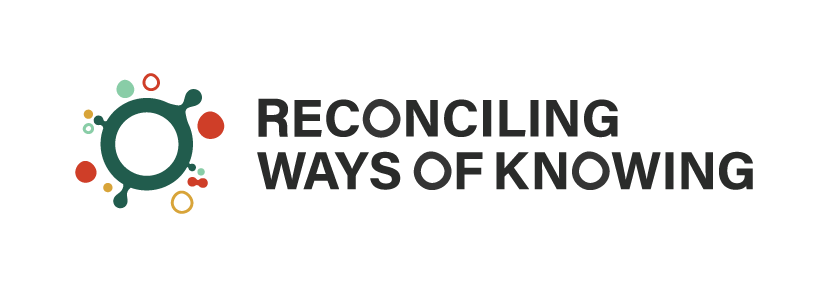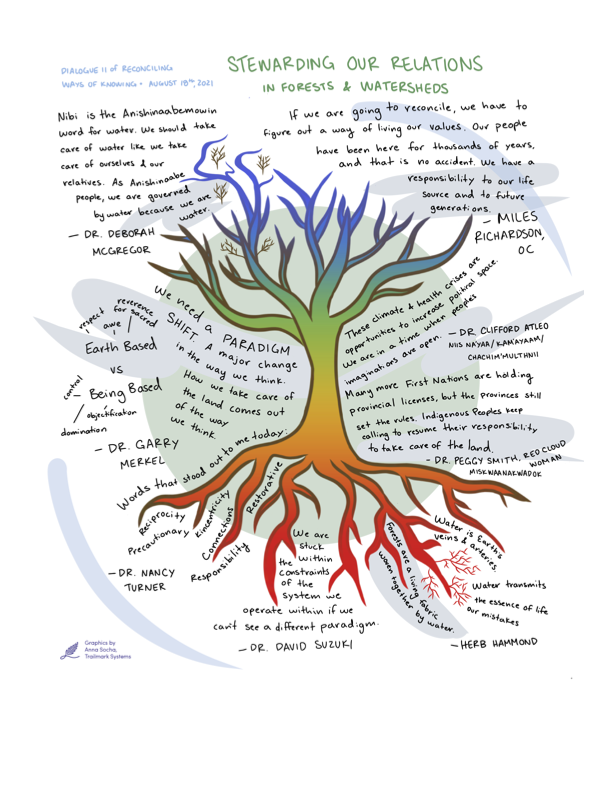Stewarding Our Relations in Forests and Watersheds
THIS DIALOGUE took place on WEDNESDAY, AUGUST 18.
As the forests and watersheds we and other species depend on face increased threats from climate-induced fires, logging, and other development, we, as stewards of this generation and those who will come after us, have a critical role to play in thinking through the relations we, as human beings should have with forest and watershed ecosystems and the diverse communities of life they sustain today.
Moderated by Dr. Clifford Atleo Jr. (Tsimshian and Nuu-chah-nulth scholar), this dialogue brought together Dr. Deborah McGregor (Canada Research Chair on Indigenous Environmental Justice), Dr. Garry Merkel (Co-chair, B.C. Strategic Old-Growth Review Panel), Herb Hammond (Forest Ecologist, Silva Forest Foundation), and Dr. Peggy Smith (Registered Professional Forester & Professor Emerita, Lakehead University) to discuss how we can restore the balance we need to live in harmony with forest and watershed ecosystems.
After hearing from the panelists, Dr. Clifford Atleo Jr. turns to our RWoK Convenors for their reflections and then to participants for their thoughts and questions for the speakers.
Speaker biographies
Niis Na'yaa/Kam'ayaam/Chachim'multhnii
Clifford Atleo, PhD
Cliff is a Tsimshian (Kitsumkalum/Kitselas) and Nuu-chah-nulth (Ahousaht) scholar who researches Indigenous governance, community development and political economy. He is interested in how Indigenous communities navigate/adopt/resist mainstream capitalism while working to sustain their unique governance institutions, cultural identities, and practices. Cliff is particularly interested in how Indigenous communities and leaders continue to assert agency within the confines of settler colonial politics and economics. His current research is exploring Indigenous communities and fossil fuel industries, climate change mitigation and adaptation, and the impacts of COVID-19 on Indigenous self-determination and territorial integrity.
Dr. Deborah McGregor
Deborah McGregor, Anishinabe, Associate Professor and Canada Research Chair: Indigenous Environmental Justice. Osgoode Hall Law School and Faculty of Environmental Studies, York University. Professor McGregor’s research has focused on Indigenous knowledge systems and their various applications in diverse contexts including environmental and water governance, environmental justice, health and environment, climate change and Indigenous legal traditions. Professor McGregor remains actively involved in a variety of Indigenous communities, serving as an advisor and continuing to engage in community-based research and initiatives. Professor McGregor has been at the forefront of Indigenous environmental justice and Indigenous research theory and practice. Her work has been shared through the IEJ project website https://iejproject.info.yorku.ca/ and UKRI International Collaboration on Indigenous research https://www.indigenous.ncrm.ac.uk/.
Dr. Garry Merkel
Garry’s lifetime of work has largely focussed on bridging Indigenous and scientific world views and knowledge to create more grounded and practical systems of land management. This work ranges from the public policy to the individual level in all walks of life. A sampling of his current work in this area includes: creating an Indigenous Lands Center in partnership with UBC and the Westbank First Nation to bridge the gap between Indigenous knowledge and contemporary land management systems; working with the BC Cabinet to foster a paradigm shift that shifts societal thinking from the current “managing for timber subject to constraints” to an “ecosystem health” management approach; leading the creation of a land stewardship plan for his home Tahltan community that is grounded in the Tahltan’s relationship to Ka-yea (Tahltan homeland); Tahltan Lead for the creation of a collaborative Tahltan-BC Land Use Plan based on a being-developed planning methodology that integrates ecosystem health and the Tahltan way of being with their lands into the resultant plan; and one member of a 2-person panel that produced “A NEW FUTURE FOR OLD FORESTS – A Strategic Review of How British Columbia Manges for Old Forest Within its Ancient Ecosystems”.
Herb Hammond
Herb Hammond is a forest ecologist and Registered Professional Forester with 40 years of experience in research, industry, teaching and consulting. Currently his work is carried out through Silva Ecosystem Consultants and the Silva Forest Foundation. He is best known for his concept and application of nature-based planning, which he formerly referred to as ecosystem-based conservation planning. He is the author of Seeing the Forest Among the Trees: The Case for Wholistic Forest Use (Polestar Press), which won the Roderick-Haig Brown B.C. Book Prize in 1992 and “Most Significant Contribution” at Bumbershoot Book Fair Awards, 1992; and Maintaining Whole Systems on Earth’s Crown: Ecosystem-based Conservation Planning for the Boreal Forest (Silva Forest Foundation).
Dr. Peggy Smith
Miskwaanakwadook—Red Cloud Woman
Dr. Smith is a Registered Professional Forester of Cree ancestry from the James Bay Treaty #9 area. She is also Professor Emerita in Lakehead University’s Faculty of Natural Resources Management and has specialized in social justice issues in the natural resources sector, particularly the recognition and protection of Indigenous Peoples’ rights. She retired in 2017 from her position as Interim Vice-Provost (Aboriginal Initiatives). She continues supervising graduate students, carrying out research projects on free, prior and informed consent, and completing an online open access book on Indigenous Peoples and Natural Resources, the course she taught at Lakehead University from 2001-2016. Peggy is active in the Forest Stewardship Council, a non-governmental organization that focuses on voluntary certification of forest companies who follow FSC standards. She is a member of the Board of the Rights and Resources Group that coordinates the Rights and Resources International Coalition whose members advocate for Indigenous land tenure rights. She is also participating in developing a national strategy for gender equity in the forest sector.

